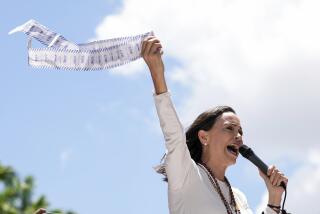Bolivian leader puts agenda to the test
LA PAZ, BOLIVIA — President Evo Morales seeks a new mandate for his socialist agenda today in a nationwide referendum that reflects deep divisions in this troubled South American nation.
Morales, his vice president and eight state governors face recall votes that could throw them all out of office. Polls indicate that Morales is likely to retain his job, though several governors who oppose his policies could lose theirs.
A tense atmosphere prevails across the country. Violent anti-government demonstrations and airport blockades forced the cancellation of an energy summit with the presidents of Argentina and Venezuela. There have been threats to obstruct the vote and reports of gunfire directed at the vehicle of a Cabinet member.
“I’m sorry to say it, but now the dictatorships of the ‘60s and ‘70s are being replaced by some groups that take airports, occupy electoral offices and take shots at ministers’ cars,” Morales said at a rally last week.
The anti-government protests have made it difficult for Morales, Bolivia’s first Indian president, to travel outside his stronghold here in the capital and the surrounding western highlands. His efforts to redistribute land and income in South America’s poorest nation have made him a hero to the struggling Indian masses and to left-wing activists worldwide.
However, many middle-class Bolivians who once supported Morales have defected. And hostility toward his government is fierce in the relatively prosperous, generally pro-capitalist lowlands. Four lowland states already have voted for autonomy, which Morales calls an illegal maneuver to divide the country. Opposition leaders likewise call today’s referendum unlawful.
Both sides are using the disputed election to push their vision of the future for this landlocked nation of 9.2 million.
Much of Bolivia’s natural gas and agricultural wealth is concentrated in the lowlands, where authorities are keen to retain tax revenue and energy royalties now destined for federal coffers. The highland Indians who form the president’s base support are in the minority there.
Morales, who rose to prominence as a fierce opponent of U.S.-backed efforts to criminalize commerce in coca leaves, the source of cocaine, has repeatedly accused Washington of trying to foment a coup against him -- a charge denied by the Bush administration. U.S.-Bolivian relations are severely strained.
In June, Morales supporters attacked the U.S. Embassy here and sought unsuccessfully to take down the U.S. flag before being fought back by police officers. Threats to aid workers later prompted Washington to withdraw personnel from the coca-growing Chapare region. Bolivia receives more than $100 million in U.S. assistance annually.
Morales strongly backs the recall referendum, and is widely expected to garner sufficient votes to remain in office and complete his five-year term. Under the recall rules, opponents seeking to unseat Morales would have to amass more than 53.7% of the vote, the total Morales won in the 2005 presidential election.
A landslide of 60% or more backing Morales would give him the impetus to proceed with constitutional revisions, including land reform that would redistribute large holdings in the eastern lowlands. Morales says they should be parceled out among peasants, angering eastern soybean farmers and other major landowners.
The new constitution also would allow Morales to seek reelection for another five-year term.
Morales assumed the presidency amid high hopes for national reconciliation after years of tumult helped chase several of his predecessors from office. But his pugnacious style, racially charged rhetoric and sweeping constitutional reforms have left the country deeply split.
“Political polarization has extended to every corner of the nation,” lamented columnist Fernando Mayorga in the La Paz daily La Razon.
Presidential strategists would like to see the ouster of several implacable critics, including Govs. Manfred Reyes Villa in Cochabama state and Jose Luis Paredes here in La Paz state.
Bolivia’s political schism is evident in the chilly high-altitude capital.
“I don’t know what’s going to happen after the referendum,” said Justo Lopez, 33, a taxi driver here who backs the president. “But we have to support Evo and the changes. We the poor want to advance.”
Hugo Flores, an accountant, said he feared Morales was becoming too authoritarian in the style of his ally, Venezuelan President Hugo Chavez.
“I’m going to vote against Evo because he has shown himself incapable of resolving the country’s problems,” said Flores, 45.
Felipa Quispe, 56, a homemaker, said she hoped today’s vote would help tame inflation.
“Everything has gone up in price. Chicken is so expensive now! We don’t know what we’re going to do,” she said. “It’s time to go out on the streets and protest.”
--
patrick.mcdonnell @latimes.com
Special correspondent Oscar Ordonez contributed to this report.
More to Read
Sign up for Essential California
The most important California stories and recommendations in your inbox every morning.
You may occasionally receive promotional content from the Los Angeles Times.










